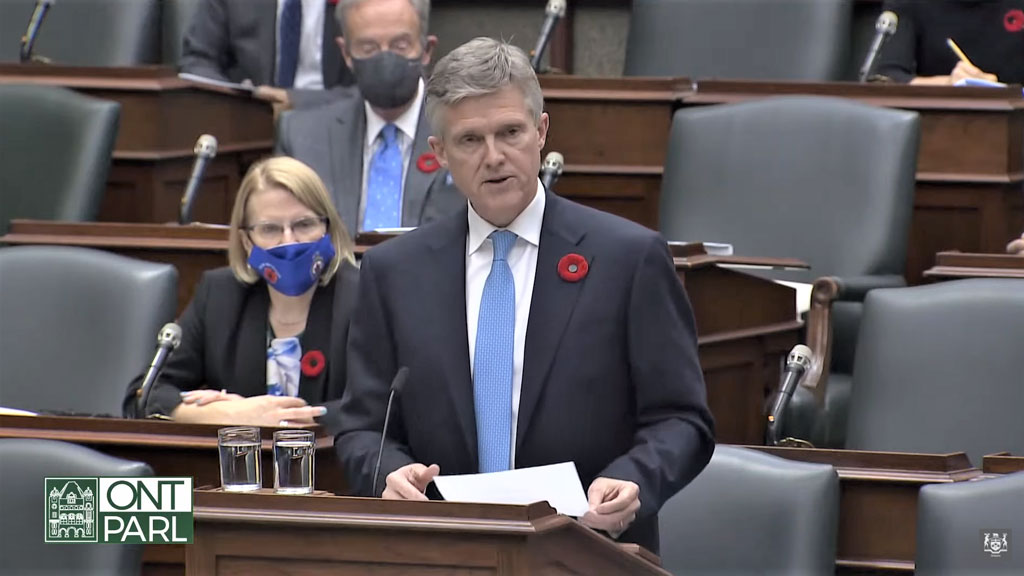Even with a paucity of significant new stimulus investment in infrastructure, Ontario construction stakeholders found lots to like in the 2020 budget package delivered by provincial Finance Minister Rod Phillips Nov. 5.
The stakeholders said they were relieved the government refrained from austerity; praised the recommitment to its existing long-term infrastructure plan; lauded plans for new skills training programs; and praised business property tax relief, measures to lower electrical bills and other initiatives intended to cut costs for businesses.
Government “did what it had to do”
“The government did what it had to do,” commented Ian Cunningham, president of the Council of Ontario Construction Associations. “There is no appetite for austerity among the population. They recognize that and the title of the budget (Ontario’s Action Plan: Protect, Support, Recover) indicates they are committed to seeing this through and conquering the virus and putting in place the environment for a strong recovery.”
Patrick Dillon, business manager of the Provincial Building and Construction Trades Council of Ontario, echoed Cunningham.
“I give them some credit, they aren’t doing what past Conservative governments may have done which is being afraid to spend,” he said. “They are parking that mentality and have the appearance of investing to help the Ontario economy, which is the right thing to be doing. The $142.9 billion in infrastructure money over the next 10 years, that is great.”
The budget projects $187 billion in spending next year including $13.6 billion on infrastructure and $680 million in additional funding over the next four years to expand broadband. The government is projecting a deficit of $38.5 billion in 2020–21, unchanged from the deficit forecast at the time of the 2020–21 First Quarter Finances update.
“The money has to start flowing”
The sharpest criticism from construction stakeholders focused on the lack of shovel-ready infrastructure spending.
Giovanni Cautillo, president of the Ontario General Contractors Association, and Andy Manahan, executive director of the Residential and Civil Construction Alliance of Ontario, both identified lags in intergovernmental negotiations that are holding up funding through such programs as the Resilience and the Safe Restart streams as serious issues for the sector.
“I am looking forward to further details,” said Cautillo. “I see further support for hospitals and schools…that is important. It looks good on paper, but the money has to start flowing.
“I know the feds have been tying things up with conditions on the flow of money, making sure it is green and this kind of stuff. I don’t think now is the time to put conditions on investments.”
In the budget document, Phillips also identified problems at the federal level for continuing delays in getting projects out the door.
“Ontario, along with all provinces and territories, is calling on the federal government to reduce delays in federal approvals for current infrastructure projects and step up with an additional $10 billion per year over 10 years for shovel-ready projects,” the budget stated.
Manahan said discussions are continuing and he has heard the impasse might soon be broken, but suggested Phillips was unable to break any news on budget day.
An additional problem, Manahan said, was that dozens of municipalities had to ask for extensions to the deadline for submitting applications for project funding.
“I think there are lots of things that are happening behind the scenes to get the stimulus flowing but unfortunately for our trilevel government structure in Canada we are not as nimble as we should be,” he said.
Local economies need a kick-start
A breakthrough is essential to enable municipalities to release project tenders for state-of-good-repair projects that could kick-start local economies over the winter and into next spring, Manahan, Cautillo and others argued.
“We are saying there are hundreds if not thousands of projects that could be activated pretty quickly across this region and across the province,” said Manahan.
Sandro Perruzza, CEO of the Ontario Society of Professional Engineers and chair of the Construction and Design Alliance of Ontario, supported that call to action in a statement.
“Although long-term capital project planning is essential, as it will take up to 10 years to design and build these projects…in order to stimulate economic growth, more emphasis should be put on the state-of-good-repair projects to get the money flowing quickly,” stated Perruzza.
The budget includes spending of $21 million this year in a new Achievement Incentive Grant for employers to encourage small- to-medium-sized employers (SME) to train apprentices; an allocation of $20 million in 2020–21 for a new Group Sponsorship Grant to encourage SMEs to develop better training and on-the-job mentorship for apprentices; and a new Skills Development Fund, which will provide $30 million over two years to support non-college apprenticeship training providers.
“We are delighted that funding increases make it possible for more of our member companies to take on and train skilled workers and apprentices, especially now during Ontario’s economic recovery,” stated Stephen Hamilton, Ontario director of public affairs for the Progressive Contractors Association of Canada. Hamilton is also chair of the Ontario Skilled Trades Alliance.
A statement from the Residential Construction Council of Ontario (RESCON) praised the government’s skilled trades and digital innovation initiatives.
“Reducing barriers to development by cutting red tape, simplifying policies and modernizing and digitizing government services to streamline the approvals process is critical to increasing housing supply necessary to support demographic trends and improve quality of life,” said RESCON president Richard Lyall.
A statement from Skills Ontario commented approvingly on the budget’s references to the government’s Ontario’s Skilled Trades Strategy, which includes “work to break the stigma around skilled trades, simplify the system and encourage employers to sponsor and hire apprentices.”
Skills Ontario CEO Ian Howcroft stated, “With the focus on filling the skills gap and simplifying the system, we can have even more reach and impact and continue to build our future skilled workforce…We support the government and its action as we both work to realize our common goals to create the skilled workforce of the future – our economic wellbeing depends on it.”
Follow the author on Twitter @DonWall_DCN.











Recent Comments
comments for this post are closed